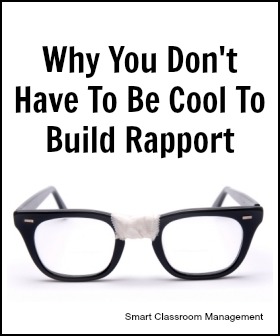 There is a common misconception that you must be “cool” in order to build rapport.
There is a common misconception that you must be “cool” in order to build rapport.
The idea being that unless you’re able to interact with students on their level, unless you can speak their pop/youth culture language and tap into their wider influences, your influence will be limited.
They’ll dismiss you and disregard what you say.
But it isn’t true.
Although building rapport is critically important for effective classroom management, any teacher behavior that unnaturally seeks to mirror age-group norms—through language, mannerisms, and attitudes—will backfire.
What can be confusing, though, and the reason so many teachers latch clumsily to this strategy, is that the problems it creates don’t develop right away.
In fact, you may feel as if you’re on the fast track to a deep and powerful relationship. Your students may indeed crowd around you after the first day of school. They may feel immediately at ease in your presence. They may be thrilled that someone so cool could actually be their teacher.
That is, until the bottom falls out and misbehavior skyrockets.
You see, while it’s true that students may initially be drawn to such a teacher, eventually—and often quickly—they’ll lose respect.
So instead of looking up to you as a leader they admire, they’ll look over at you as a friend who disappoints them. They’ll react with shock and outrage if you dare hold them accountable. They’ll become silly and unruly and brazenly disrespectful.
They’ll stop taking you seriously.
Influential rapport isn’t born of an ability to tap into your students’ generational mores. It doesn’t develop through your adept use of modern slang, knowledge of popular music, or comfort saying “Hashtag, remember to get your homework done.”
You don’t have to have a certain look, dress a certain way, or in any way change who you are.
Building trusting rapport is a byproduct of your consistent, day-after-day pleasantness and willingness to see the best in your students. It’s your God-given personality, your realness, your uniqueness, and your humor that will draw students irresistibly into your circle of influence.
It’s your leadership, your forthrightness, and your follow-through that will earn the respect of even the most jaded students. It’s the staggering combination of your gentle kindness and rock-solid adherence to clearly defined boundaries that offer the keys to the kingdom.
Young or experienced, new teacher or veteran, it matters not one bit. Anyone, anywhere, in any teaching situation can build the influential rapport needed to create the peaceful classroom they desire.
You can do this.
Just the way you are.
If you haven’t done so already, please join us. It’s free! Click here and begin receiving classroom management articles like this one in your email box every week.

Thinking back to my favorite teachers… some were “cool” but never in a same-age sort of way. They were “adult cool”–funny, awesome, but still an entirely different level than us. And others weren’t cool at all. But still great, beloved teachers.
I have been teaching for nearly 30 years and have attended a number of management courses, some of which are directly opposed to what I am reading on your blog but I have to say that nothing has ever rung as true as the wisdom I am reading now. I have always had a struggle with management. I had just accepted that some teachers ‘just had a commanding presence’ and some , like me just didn’t.
I wish I had read this 30 years ago! What a breath of fresh air! You give me every reason to hope I too can have that ‘presence’. I have a lifetime of bad habits to unlearn – sarcasm, eye rolling, giving ‘the look’, to name just a few, but I am willing to learn. Every day I walk in to the classroom and remind myself to stay calm and unemotional, no lectures and no repeating myself. It has already taken a load of responsibility off me and transferred it to the student. I also have a store of information to refer back to when I reflect on what I might have missed in any circumstance that may have ocurred. I find it hard to ‘not care’ when a child misbehaves. I know I still have a long way to go but I’m on the way.
Thanks so much for your weekly encouragements. I look forward to reading them every Sunday evening, ready to point me in the right direction for the coming week.
Great to hear, Jane! I’m so glad you found us.
Michael
As an academic intervention coach working with at-risk students, how would you:
1. How do you build rapport with your students?
2. Tell us about an approach that works well with students ( what’s best for you? what’s
best for students?)
3. One thing you wished you know when starting out as academic coach?
4. One favorite thing about working as academic coach?
I am reading your articles on a regular basis, and they are great!. I would appreciate if answer these 4 questions in not more than 3 sentences each. I am also ordering your 3 books. I hope my school will approve the budget for it.
Thank you
Dr. Mohammad jadun
Hi Mohammad,
I’m not an academic intervention coach, so I’m unable to answer questions 3 and 4. As for the first two questions, we have over three hundred articles on our website that address each one thoroughly. The entire site represents my approach.
Michael